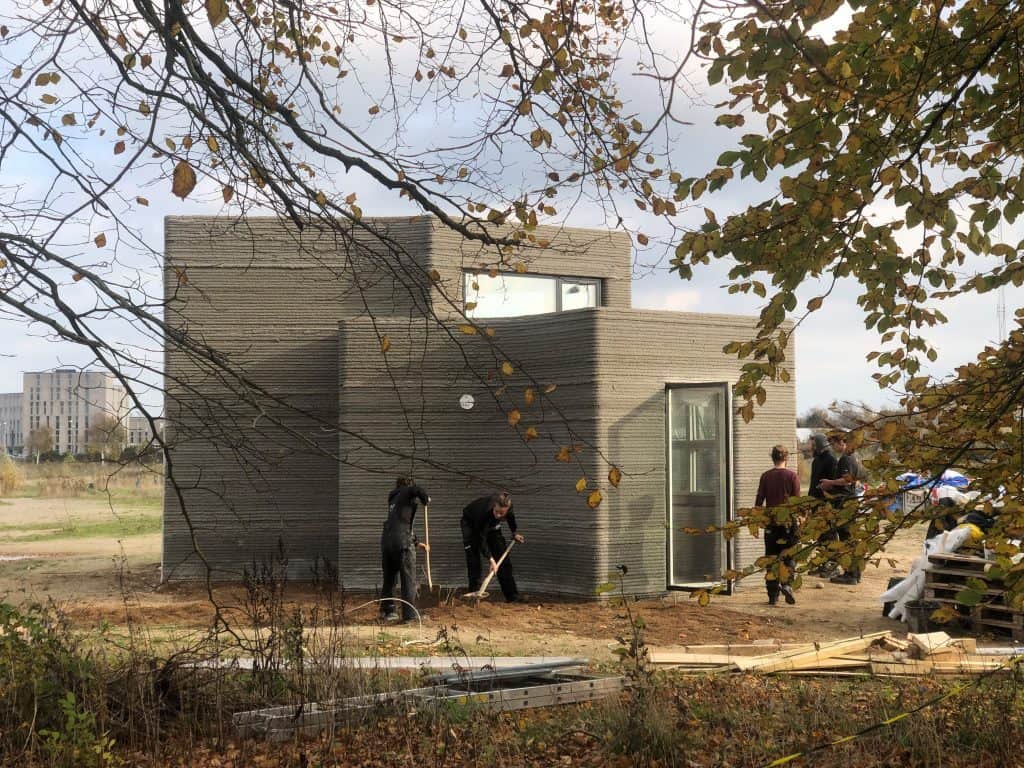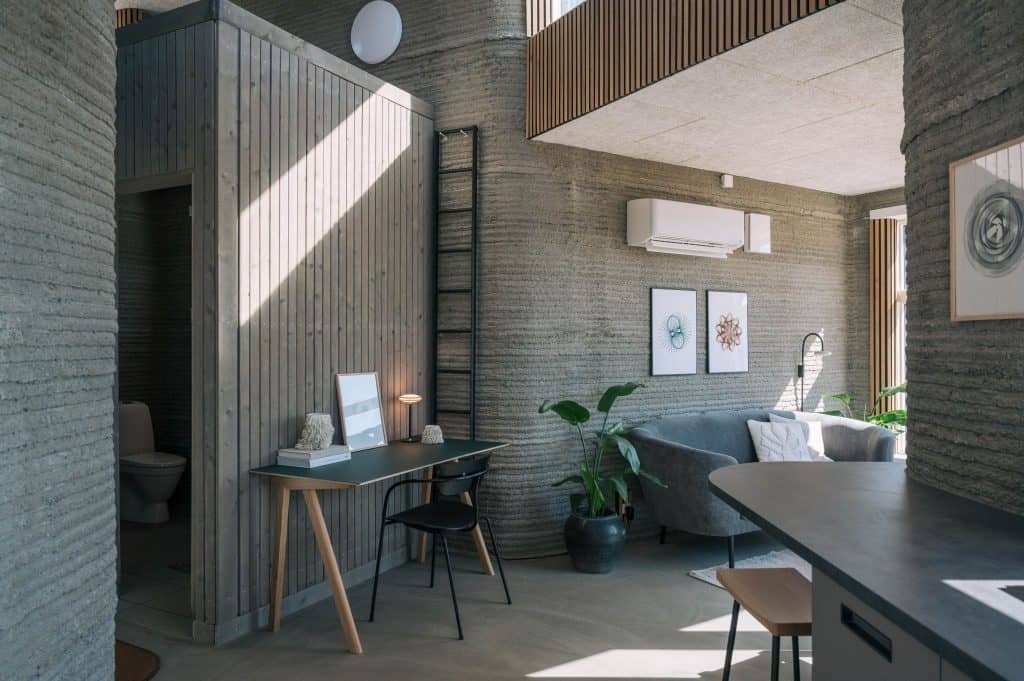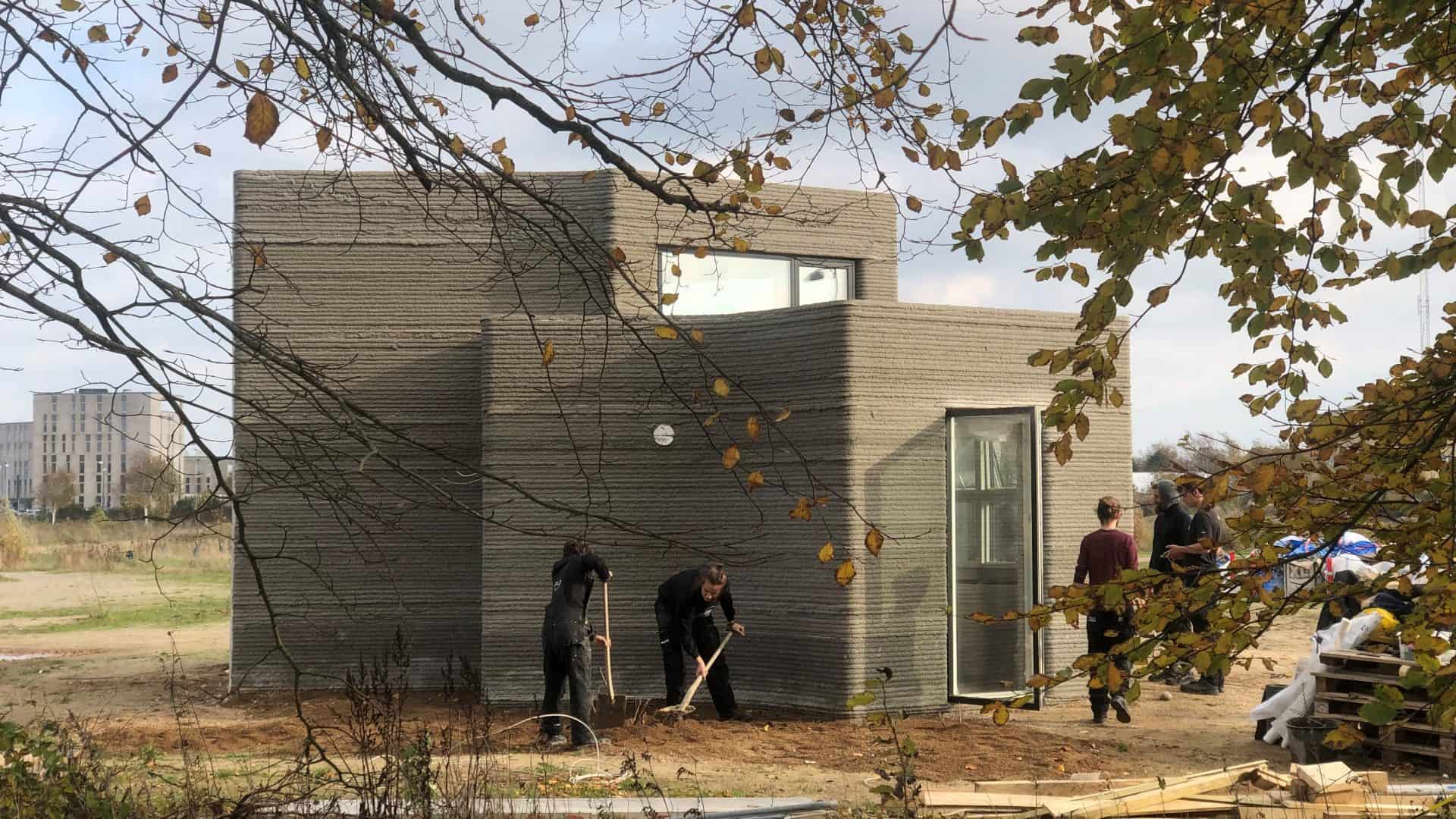- To drive down cost the walls, roof and the foundation were 3D printed using low-cost real concrete (not mortar) – with an innovative new method for making the roof
- Renowned and visionary Danish architects Saga Space Architects designed the building
Danish 3D construction printing company, 3DCP Group, recently revealed their Tiny House located in Holstebro, Denmark, designed and fabricated to be as affordable as possible. On just 37 m2/398,265 ft2 the building contains a bathroom, an open plan kitchen, a living room, and a bedroom. To save space, the bedroom was placed on a mezzanine floor above the bathroom. In line with Nordic building traditions wood is characterizing the interior.
The house is shaped in a triangular circle connected by an open middle core. In each end of the triangle, you find the kitchen, the living room, and the bathroom. To accommodate the bedroom on top of the bathroom, the roof above the end of the triangle with the bathroom and bedroom has been levitated.

Architect Sebastian Aristotelis from Saga Space Architects who designed the house says: “Our task was to make a small housing unit for students, which should contain all the rooms and functionalities of a normal house, but be so low cost, that even students could afford to live in it. We solved the task by making a design which provides a very effective use of each square meter still giving the inhabitants the feeling of being in a much larger house by having a large open area in the middle.”
3DCP Group decided to use COBOD’s BOD2 3D construction printer for the execution. Not only can the printer make unusual shapes, but it can also print with real concrete for a low cost and help to make the roof and the foundation.
Mikkel Brich, CEO of 3DCP Group explains: “3D print technology is a real gamechanger in construction as it brings new architecture to life that would otherwise not have been possible by conventional brick and mortar methods. COBOD’s innovative 3D construction printing technology makes it possible to print with real concrete, increase efficiency and significantly reduce the man-hours used in construction. We could not have realized the design using any other method.”
According to Mikkel Brich, studies have shown that 3D printing uses 70% less concrete compared to concrete element construction and that CO2 emissions from construction sites can be reduced by up to 32% when using 3D printing. By automating processes and building with construction robots it is also possible to reduce the man-hours in the construction process by up to 50%.

The design of the house required the roof to be made of 5 parts, each with quite a unique shape. Sourcing such a roof from a precast plant would be virtually impossible and making it with formwork equipment was deemed to be very costly. Therefore, 3DCP Group used a new innovative method for making the roof, where the printer did as much of the roof as possible by letting it print the first part of the roof on the ground, after which the roof parts were lifted into place on the building and then casted together, as can be seen in this video.
Commenting on the successful build of the Tiny House, Henrik Lund-Nielsen, Founder & General Manager of COBOD International said: “We are proud to have made the technology for this project. 3DCP Group proved that the technology can not only make the walls but can also help make the foundation and the roof. Making roofs with unusual shapes using our technology without the need for formwork equipment is a new and cost saving method for the construction sector globally.”
About COBOD International
Our mission is to disrupt the global construction industry through world class multifunctional construction robots based on 3D printing systems. Faster. Better. Cheaper. We 3D printed Europe’s first building in 2017. Subsequently the first 2- and 3-story buildings in Europe, specifically in Belgium and Germany were made with our technology. Also, the first villa in Dubai and the first buildings in Africa have been done by our 3D construction printers, like the first wind turbine bases. We have an open-source strategy, partnering with customers, academic institutions, and suppliers around the world. Our partners include GE (US), PERI (Germany), Cemex (Mexico), Holcim (Switzerland), Dar Al Arkan (Saudi Arabia), L&T Construction (India), and JGC (Japan). Our vision is to see buildings and concrete structures in every city around the world made by multifunctional construction robots. HQ in Denmark, +80 highly competent pioneers from 20 nationalities and truly global presence in Asia, Middle East, Africa, Europe, North, Latin, and South America.
About 3DCP Group
We print buildings. 3DCP GROUP is striving towards a firsthand implementation of state-of-the-art 3D construction printing technology. The aim is to build better, faster, greener and to reduce the amount of strenuous work in the construction process. We have in-house architects, engineering and builders and are thus able to take a project all the way from idea to finished construction.
See a full interview with Mikkel Brich in the video here.
Photos and videos can be used freely by media.
Photo credit: 3DCP & Saga Space Architects. Video credit: COBOD
